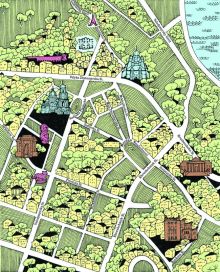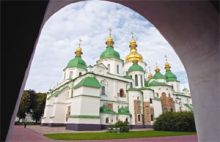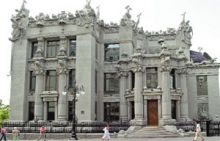Every period in the 1,530-year-long history of Kyiv has left its imprint in the city. However, some of them hid the heritage of the previous time or even destroyed it. By no means seeking to be all-embracing, we offer for your attention three routes via living, old-time and modern, Kyiv.
THE ROUTE “SECOND JERUSALEM”
Sophia of Kyiv,
24 Volodymyrska Street
One of the main Christian shrines in Eastern Europe, the historic heart of the Kyiv Metropolitan See, Sophia of Kyiv belongs to innumerous structures of Kyivan Rus’, which have been preserved. This is a most prayerful place. Sophia, founded in the 11th century, being a monument of Ukrainian architecture and monumental painting of the 11th-18th centuries, has not only been the center of spiritual life, but political and cultural life as well. This is a place where the first known library and school in Rus’ were established. Its specific treasures include one of the works of Ukrainian baroque art, Zaborovsky Gate, and the first monastery wall erected in 1745-46, which one can observe from Striletsky provulok. The present-day monument is only a part of the 18th century gate. Only its western portal with pediment of the initial building has been preserved.
Kyiv Cave Monastery,
15 Lavrska Street
St. Michael’s Golden-Domed Monastery
6 Triokhsviatytelska Street
This architectural complex has been reconstructed in our time. And it was built in 1108-13 by Kyiv Prince Sviatopolk Iziaslavych. The unique ensemble of Ukrainian architecture was destroyed in Soviet time.
The frescoes and mosaics were taken away to Moscow, St. Petersburg, Novgorod and other cities of the USSR. The mosaic composition Eucharist was taken to St. Sophia’s Cathedral. Many small paintings went to the Lavra Preserve. In the years of the World War II some frescoes were brought to Germany whence they were brought to Hermitage in Leningrad.
Old-Kyiv Hills
Especially precious is the place where the Church of the Dormition of the Virgin, built in late 10th century, used to stand. It is considered the first stone church of the Kyivan Rus’. The remains of the fundament of the Church of the Dormition of the Virgin are a monument of national importance. Volodymyr’s Princely Court, the Church of the Dormition of the Virgin and the tracts lying nearby, such as Honchari, Dekhtiarivka, Old Castle Hill, Khorevytsia, Kyselivka, Florivska (Frolivska) Hill, are unique places. Probably there is no other place in the world, where in the capital’s heart, ten steps from the asphalt roads you can find yourself in the domain of nature, where wormwood, yarrow, and knotgrass have been growing for centuries. This is a place where ancient nature and history merge.
VLADYSLAV HORODETSKY ARCHITECTURAL ROUTE
Young architect Vladyslav Horodetsky after graduating from Imperial Academy of Arts in Saint Petersburg came to Kyiv in 1890 and lived there for 30 years. His best architectural works now adorn the city.
National Art Museum
6 Hrushevskoho Street
The building was constructed in 1899. The total of 249,000 rubles, 100,000 of which were provided by the government and 108,000 were donated by the Tereshchenko family, were spent on the construction works.
Artist’s House
7 Yaroslaviv Val Street
Kenesa was built at the initiative of Solomon Cohen and with the blessing of Joseph Sultan during 1898-1902 years.
St. Nicholas Cathedral
77 Velyka Vasylkivska Street
The church was constructed in 1899 through 1909 and was built in Neo-Gothic style. In 1936 the church was closed by the Soviet authorities and was used as a storeroom. In 1978 the building was given to the House of Organ Music.
House with Chimeras
10 Bankova Street
The building was constructed in 1901-1903 as a profitable house (apartments for rent). It got its name for the sculptural decorations – they all were made in the theme of animal land and underwater world, hunting attributes, and fairy tale creatures. Today this building is a presidential residence.
“MODERN KYIV” ROUTE
“Cats place” near Golden Gates
Right next to the restored monument of the Kyivan Rus’ times there is a bronze monument to the cat-habitue of the “Pantagruel” restaurant – a couple of kittens who climbed up the trees: one is wooden – opposite his bronze relative, and the other, made of plastic forks, in a public garden of a coffee place near Golden Gates. The author of these objects is also Kostiantyn Skretutsky.
Peizazhna Alley
In 2009 a children’s park was constructed on Peizazhna Alley, located on the site of the dug defensive banks of the Upper Town above the village of Honchari. Renowned city sculptor Kostiantyn Skretutsky was in charge of the site improvement. In the recent years this place has become a symbol of resistance of local community activists to the real estate development in Kyiv.
“Hedgehog in the Fog”
“Animal” monument is famous because of the well-known cartoon character created by Yurii Norstein is placed at the intersection of Zolotovoritska and Reitarska Streets and Heorhiivsk Lane.
Nikolai’s Nose
Fans of the talent of Nikolai Gogol should visit the Triptych Gallery (on Andriivsky Uzviz). Outside the gallery they will be able to rub the bronze nose of the great writer. Artists decided to dignify the famous writer in such a way and put on a display the famous Gogol’s nose.










